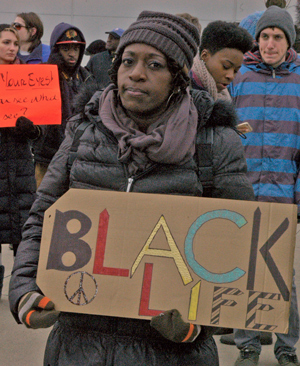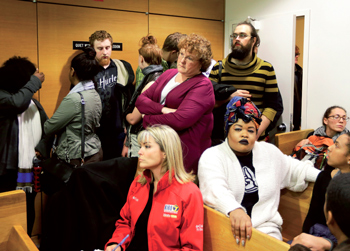No indictment, no faith in justice system
By Saeed Shabazz -Staff Writer- | Last updated: Dec 9, 2014 - 5:36:38 PMWhat's your opinion on this article?

Protestor in Chicago joins movement to respect Black life and end police abuses, racial profiling and obtain justice. Photo: Haroon Rajaee
|
The 23-member Staten Island grand jury’s decision came a week after there was no indictment in Ferguson, Mo., for a police officer’s killing of 18-year-old Michael Brown. However, unlike the Ferguson case, there was a video that went viral of Mr. Garner at the mercy of a swarm of police, one of whom used what looked like a chokehold around his neck. “I can’t breathe! I can’t breathe! I can’t breathe!” Mr. Garner gasped 11 times with his last breath.
The failure to indict brought questions from hard right wingers like Glenn Beck and Blacks on the left, like Prof. Michael Eric Dyson. President Obama was even forced to talk about and respond to the problem of police targeting of Blacks. (See related story on page 5.)
Gov. Andrew Cuomo told the media a “soup-to-nuts” review of New York’s criminal justice system would occur. The focus will be on reforming the grand jury system during the legislative session that starts in January, he said.
The focus of many has shifted to the cozy relationship between prosecutors and the cops they depend on to help solve crime and put people in jail. Many are calling for special offices to investigate police shootings. Prosecutors aren’t independent enough to probe police officers, they said.
Unless the governor is talking about “radical reform” of the system, what would change? asked newly elected state lawmaker Charles Barron from East New York. “One of the first issues I plan on tackling when I get to Albany is to demand that we no longer have any grand juries,” Mr. Barron told The Final Call.
“We don’t have faith in the criminal justice system now; obviously there is great mistrust,” Dr. Ron Daniels, president of the Institute of The Black World, said. “This struggle is about defining the relationship of Black people to the United States—we need a whole paradigm shift.”

Journalists and supporters of protesters arrested over the weekend in Seattle fill a King Co. district courtroom, Dec. 8, for bail hearings for three of the protesters who were arrested during demonstrations against the decisions not to indict police officers who killed men in Ferguson, Missouri and New York. Photo credit: AP Wide World
|
“You had a corrupt grand jury process. By that I mean grand juries are supposed to indict, they always indict, at least 98 percent of the time they indict. The threshold is very low,” said Dr. Lisa Brock, a college history professor from Chicago. She believes a majority of Americans want change, but sees a kind of fascist cabal holding people hostage—including police departments and right wing politicians, like the Tea Party and the GOP.
Ferguson set the tone, whenever you don’t allow for peaceful change to occur you have violence, Mr. Barron said. “We took the Brooklyn Bridge, the Barclay Center, Union Square and 34th Street. December 19 it’s Wall Street for a Black Day of Outrage. This whole country is on fire because of Ferguson and Eric Garner,” he noted.
“These young people aren’t seeking to reform the system, because they realize that there are so many layers to the system. And they are in the streets of Ferguson and Berkeley not believing that they will ever get justice from this system,” said Rosa Clemente, a writer and community organizer.
“The youth are very clear that none of this is working. Now there is a break with the old-line Black-Latino middle class establishment,” Ms. Clemente told The Final Call. These young people are going to stay in the street—even when the spotlight goes out, she added.
“The justice system, as the people’s lawyer Kamau Franklin has said recently, is working perfectly. It is not at all a failure. The rule of law is always established by conquerors as a method of organizing, justifying and maintaining their ability to exploit,” said Dr. Jared A. Ball, a professor Morgan State University in Baltimore. “I think only increased levels of organization on our part can develop a solution to this or any other problem,” said Dr. Ball, who is also a writer and radio host.
Everyone protesting the non-decisions around Michael Brown and Eric Garner should immediately join an organization and then push that organization to become revolutionary as possible, he advised.
“In the wake of the decisions not to indict White police officers, Darren Wilson and Daniel Pantaleo, the people are once again left with egg on their faces in their hopes for justice, while at the same time lacking comprehensive Black leadership that stands between the continued disrespect and assaults at the hands of state-police violence,” commented Jihad Adbulmumit of the National Jericho Movement.
Dr. Daniels said the current system exists to “criminalize a race” and as a “criminal punishment system.” Mr. Garner was criminalized around the nonsense of selling cigarettes, Dr. Daniels noted.
The media cited quickly Mr. Garner’s arrest record, which was for mainly small time violations, but didn’t quickly report how police officer Daniel Pantaleo cost the city $30,000 in January amid accusations of violating the civil rights of two Black men on a Staten Island street. The city settled the case. Another pending case alleges he and other officers filed trumped up drug charges against a suspect in February 2012, charges that were dropped against a Black man in Staten Island, which is a majority White borough and home to many White police officers and firefighters.
“It is rough being a Black man on SI,” Jason Price, 53, told The Final Call. “I know the police look at the youth suspiciously.” I have a 22-year-old son and I tell him to keep his hands out of his pockets and if you are asked a question, answer it respectfully, Mr. Price said.
“They do what they want to us,” said a 39-year-old construction worker, who wanted to be identified only as “Cosmo.” It is a constant violation of our rights, he added. Another 35-year-old told The Final Call police drive up in vans and arrest teenagers in regular sweeps for low-level marijuana possession—and ruining chances to get good jobs.
“I was beat up, look they knocked my teeth out, because I questioned why they were stopping me,” said J.J., 34. “We live in what they call a ‘red zone,’ which means they can harass us and lock us up because of the street we are standing on,” he said.
Ed Josey, president of the Staten Island chapter of the NAACP since 1997, said he has filed several complaints with the Civilian Complaint Review Board about police abuses with no results. “I have visited the 120th Precinct on many an occasion to speak about what is occurring in the Black community and nothing changes,” Mr. Josey said.
INSIDE STORIES AND REVIEWS
-
-
About Harriett ... and the Negro Hollywood Road Show
By Rabiah Muhammad, Guest Columnist » Full Story -
Skepticism greets Jay-Z, NFL talk of inspiring change
By Bryan 18X Crawford and Richard B. Muhammad The Final Call Newspaper @TheFinalCall » Full Story -
The painful problem of Black girls and suicide
By Charlene Muhammad -National Correspondent- » Full Story -
Exploitation of Innocence - Report: Perceptions, policies hurting Black girls
By Charlene Muhammad -National Correspondent- » Full Story -
Big Ballin: Big ideas fuel a father’s Big Baller Brand and brash business sense
By Bryan Crawford -Contributing Writer- » Full Story






 Click Here Stay Connected!
Click Here Stay Connected!








